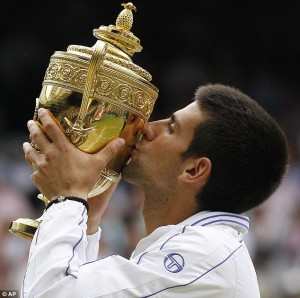
Novak Djokovic winning his second Wimbledon title, and crediting a gluten-free diet as a key to success
It’s all over the news: professional athletes turning in amazing performances and crediting a gluten free diet for improvements to their games. But is a gluten free diet for athletes healthful?
Tennis phenom Novak Djokovic switched to a gluten-free diet after learning of a gluten sensitivity, and soon thereafter won the U.S. Open and Wimbledon in 2011 (and four more times, including in 2019). He has gone on to extend his record, winning an incredible 16 grand slam titles and becoming the only tennis pro to hold all four Grand Slams on three different surfaces at once.
After his Wimbledon win in 2018, he credited his plant-based, gluten-free diet for much his success.
When his nutritionist determined that he was “allergic to gluten,” he eliminated gluten from his diet, lost weight, and says he quickly “felt sharper. ” Importantly, his coach describes that since the dietary change, Djokovic is “able to breathe better and take in more oxygen. His body is much healthier and this is the key.” His improvement has been marked; the Wall Street Journal also dubbed him “the world’s best athlete of 2011.” Want to know what his meals look like? Read on: “The Foods That Turned Djokovic into the No.1 Player in the Game.”
Note: veganism/plant-based diets are also growing in popularity among top professional athletes including Djokovic, Alex Morgan, Cam Newton, Tom Brady, Venus Williams, Chris Paul and Kyrie Irving.
Other Top Professional Athletes Now Following a Gluten-Free Diet:
- Olympic champion speedskater Christine Nesbitt has seen a noticeable improvement in recovery and performance after going gluten-free with her celiac diagnosis in 2013.
- 2012 Olympic Pole Vault gold medalist Jenn Suhr nearly retired after 10 national titles (the most of any active American track & field athlete), due to crippling leg cramps, dehydration and general weakness. After a diagnosis of celiac disease and starting a gluten-free diet, she is now at the height of her game.
- USA swimmer Dana Vollmer overcame endurance problems by going gluten free, and subsequently earned the USA’s first gold medal of the 2011 World Championships in the 100-meter butterfly. She subsequently broke the world record and won the gold in the 100-m butterfly at the 2012 Olympics.
- Chicago White Sox 3rd Baseman Brent Morel discovered gluten sensitivity was at the root of his weight loss problems.
- Sabine Lisicki, another on the tennis pro-tour, collapsed during a match and had to be carried off the court on a stretcher. She now says that “my body let me down,” since doctors recently discovered she has an intolerance to gluten.
- Triathlete Terra Castro follows a gluten-free diet due to her diagnosed intolerance and pro triathelete Desiree Ficker is a diagnosed celiac. They get their requisite carbs from sweet potatoes, gluten-free cereals, quinoa and rice-based breads, and other GF pastas.
- Pro golfer Sarah Jane Smith has celiac disease.
- Superbowl XLIV MVP Quarterback Drew Brees has a long list of food allergies, restricting his diet to foods free from dairy, wheat, gluten, eggs and nuts.
- Welterweight fighter Dennis “Superman” Hallman was diagnosed with celiac disease after 10 years of undiagnosed fatigue and struggles with major endurance problems.
- Green Bay Packers running back James Starks recently followed a nutritionist’s advice and started a gluten-free diet; as a result, he has healed faster, gained the “right kind” of weight and gotten stronger.
- Kyle Korver of the Chicago Bulls switched to a gluten-free diet in 2010 to boost his performance, but has noticed an improvement in his post-game recovery as an added benefit.
- Former Florida State Quarterback Clint Trickett announced that he has celiac disease and because of a gluten-free diet, is now able to gain the weight he needs to be competitive.
- US Golf Pro Michelle Wie recently began the diet after hearing of Djokovik’s improved performance — she says it has helped the swelling in her hands.
- Nicola Browne, Player of the Tournament in the 2010 Women’s World Twenty20 Cricket Tournament for New Zealand, announced early retirement due to extreme fatigue. Once diagnosed with celiac disease and on a gluten-free diet, she returned to cricket, and to the 2012 Women’s World Twenty20.
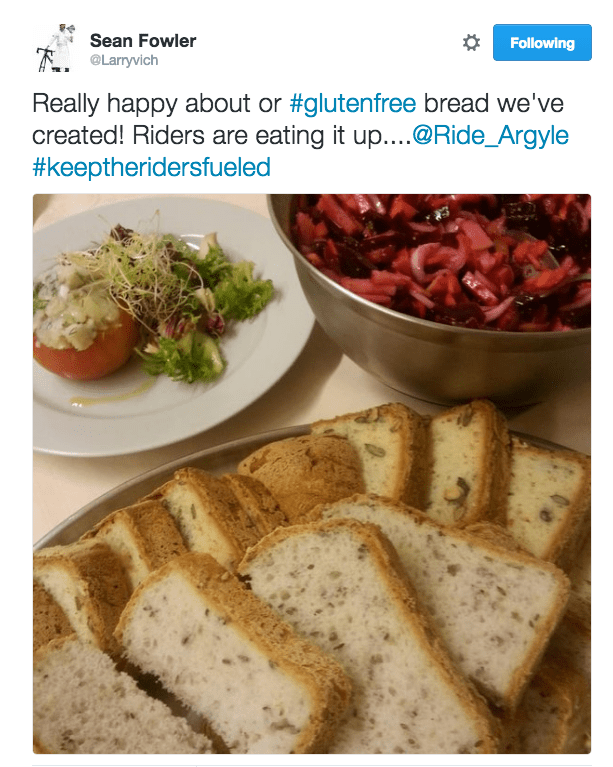 Gluten Free in The Tour de France
Gluten Free in The Tour de France
With the Tour de France on in the background at my house nearly every day in July, I’m always interested in cycling teams who go gluten free. A former US team — Cannondale Pro — (based in Colorado) put the entire team on a gluten-free training regimen as early as 2009. Their chef, Sean Fowler, told Bon Appetit Magazine “We’ve seen a definite improvement … [a]nd when you see a definite improvement, that’s a lot, because they’re at a level most of us can’t comprehend. To improve your digestion and your capacity to ingest more calories at this level is amazing.”
As of 2017, the Cannondale-Drapac team still rejected wheat (the chef didn’t like to call it gluten), dairy and white sugar on their training table at that year’s Tour, according to a 2017 Business Insider interview.
The Team made the switch to gluten free to reduce inflammation:
At the Tour de France, one of the biggest goals is to maintain as low a state of inflammation as possible. The amount of inflammation that the riders bodies accumulate during the day is so high that any little bit of help we can give them, and this includes dietary modifications, is essential.
An anti-inflammatory diet, it is believed, aids the body’s natural mending process, allowing athletes to recover more quickly for their next event.
Said the team chiropractor, Kevin Reichlin,
I believe that the high amounts of wheat products that are normally consumed by bike racers at the Tour have an inflammatory effect in the body. I believe that most people have either an overt allergy to wheat products (as Julian Dean demonstrates) or at least a sub-symptomatic inflammatory response to wheat products.
This approach must be working for the team, as they won the Team competition that year in the Tour de France, and accumulated stage wins and yellow jerseys along the way as well!
It’s unclear if any of this year’s teams have totally eschewed gluten, and a Colorado study questions whether a gluten-free diet truly offers any measurable benefit for cyclists without celiac disease or gluten-sensitivity. However, a properly balanced gluten-free diet is not harmful.
Cyclist Julian Dean is apparently wheat allergic and must follow the diet at all times; then teammate Christian Vande Velde, however, had not been diagnosed with gluten intolerance, but experienced a marked change for the better since joining the team on the gluten-free diet. He admitted after starting the diet in 2009, “I arrived in the mountains and to the first rest day with more energy than I ever have had. I was fresh mentally and physically.”
The right foods are critical for cyclists – read why here. Want to see what a typical meal looks like in the gluten-free Garmin bus? This doesn’t sound like deprivation to me!
[R]ice and yams plus a meat dish or salmon. There is always a big green salad and a side salad of beets and oranges. Along with beets, kale, spinach and broccoli are commonly found on the Garmin-Cervélo dinner table…. [T]hese foods, as well as pumpkin seeds and blueberries, are nitrate rich.
 Interesting trivia for you: the Garmin-Cervélo team’s food was presented in the “Clif Bar Food Mobile.” Not many Clif bars are actually gluten-free; you can find the few that are by going to their site (read about Clif’s gluten-free Luna Protein Bar & now the LUNA bar line up is completely gluten free). The one pictured on the team’s website — Clif Builder Bar — is full of protein and essential carbs, but is not gluten-free.
Interesting trivia for you: the Garmin-Cervélo team’s food was presented in the “Clif Bar Food Mobile.” Not many Clif bars are actually gluten-free; you can find the few that are by going to their site (read about Clif’s gluten-free Luna Protein Bar & now the LUNA bar line up is completely gluten free). The one pictured on the team’s website — Clif Builder Bar — is full of protein and essential carbs, but is not gluten-free.
*On a sad-but-know-it-well note, Kiwi Greg Henderson was accidentally served gluten at breakfast during one leg of the Tour de Suisse, causing frequent “nature breaks” during the race which put him finishing second to last! This poor showing contributed to him failing to make the cut for what he had hoped would be his debut at the Tour de France.
Should Athletes Follow a Gluten-Free Diet?
So we might ask if athletes should follow a gluten-free diet, whether they have celiac, wheat allergy, gluten intolerance, or not?
The general answer is to consult your team doctor or personal physician for advice tailored to your needs. If you are not experiencing health problems, you may want to try the diet to see if it brings you any performance improvements — after all, every body is different, and it might work for you. If you are experiencing health problems though, you should definitely be tested for celiac disease before embarking on a gluten-free diet, as a diagnosis is not possible if you are not eating gluten at the time of testing. (To read more about whether the gluten-free diet is right for you, check out this article).
While there is plenty of anecdotal evidence that some people perform better on a gluten free diet, a recent study suggests that a diet devoid of gluten may not in fact make any difference for most. Another study announced in 2016 of non-celiac, non-gluten sensitive athletes in Australia and British Columbia also failed to reveal any significant performance differences when following a gluten-free diet versus while eating gluten. The study was short-term, testing the athletes after only one week of being gluten-free versus one week of eating gluten. The study’s author admits that it remains unknown whether verifiable improvements in performance would occur if avoiding gluten for a longer period of time.
If you are thinking of trying a gluten-free diet as a weight-loss plan, think again. Some people experience weight loss, but many don’t. The diet can be super-healthy but it’s also super-easy to not get the proper nutrients if you are not careful with your food choices. There are just as many junk foods and empty calories from processed foods out there on a gluten-free diet as on wheat-full diet.
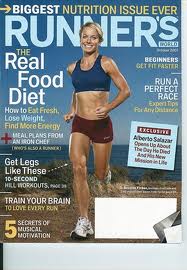 I like the way pro triathlete and fellow celiac Desiree Ficker put it when she said she thinks the gluten-free diet might benefit people, even without a diagnosed medical condition. “It does end up being a lot healthier because it forces you to stay away from overly processed foods,” she says. “I learned how to cook for myself so things don’t taste like sawdust. I don’t know if I lost any weight on the scale, but I definitely got a lot leaner.”
I like the way pro triathlete and fellow celiac Desiree Ficker put it when she said she thinks the gluten-free diet might benefit people, even without a diagnosed medical condition. “It does end up being a lot healthier because it forces you to stay away from overly processed foods,” she says. “I learned how to cook for myself so things don’t taste like sawdust. I don’t know if I lost any weight on the scale, but I definitely got a lot leaner.”
Check out some of these super healthy, super tasty gluten-free recipes:
Reverse Gluten Free Oatmeal Crisp
Eat-Your-Veggies Gluten Free Zucchini Bread
Light & Healthy Chocolate Cake
Gluten Free Vegan Sweet Potato Black Bean Burgers
Gluten Free Vegan Spring Rolls
Healthy Gluten Free Apple Bread
Chilled Mexican Pea or Lentil Salad
Gluten Free Avocado Pesto Pasta
The post Helpful? Gluten Free Diet for Athletes appeared first on Gluten free recipes - gfJules - with the REAL Jules.

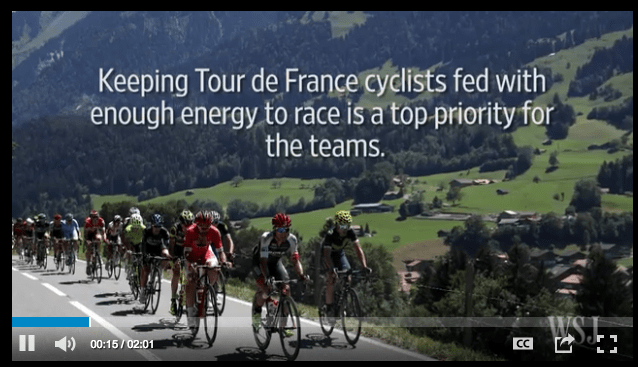
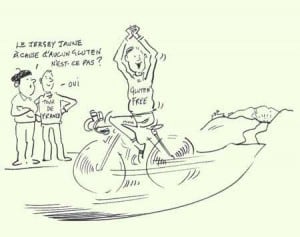
Leave a comment